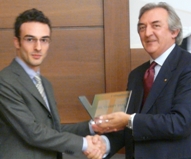A Bocconi Student Represents 2010 Virtual Talent
It was just a game, but it was a game that is very close to the reality that students face after graduation. At least for students who choose the competitive world of consulting. This is Virtual Talent 2010, promoted by Asseprim-Professional Services Associations for Enterprises, and the winner of the competition was Ivan Cogliati, from the Province of Lecco, enrolled in his second year of the Master of Science in Marketing Management, held in English. Ivan beat the around 100 competitors (out of a total of 200 who applied), from the Milanese universities of Bocconi, Bicocca, Cattolica, Politecnico and Statale.
"My goal was to finish in the top 10," says Ivan, "to be able to earn an internship at one of the 700 companies associated with Asseprim. After I finish studying I would like to work in consulting, a sector which would allow me to get experience in various fields to then understand which sector best suits my abilities." The business game, Ivan continues "is a road well-traveled in this era with many large international brands."
 |
Ivan won a virtual challenge in which his organizational, management and sales skills were key, and which was played online through a targeted portal, with participants divided into settings (markets) with 5 contestants each. In their virtual companies they needed to evaluate the market, make operative decisions and verify results. Each participant has 5 games available, each of which represents a two-month period. The market evaluation is based on 5 parameters: quantitative knowledge of companies and their needs; success factors; time; deductions and margins; and client portfolio. There are two kinds of operative decisions: time management for employees and collaborators and sales actions. Verification of results allows participants to understand how they're doing and possibly correct their choices in following months. Qualitative tests do not contribute to success on the market, but they do help determine the final success in the ranking, since 70% of the final points awarded are from sales results and 30% are from qualitative tests.
It is a complex and very exciting game because, as Ivan explains, a notebook computer is given to the first place participant. "All students, no matter what they have studied, have the same chances of winning. The rules aren't really that strict and individual skill and experimentation are very important."